छत्तीसगढ़ का राज्य पशु "जंगली भैंसा"
छत्तीसगढ़ का राजकीय/राज्य पशु "वन भैंसा/ जंगली भैंसा" है। छत्तीसगढ़ में पाए जाने वाली भैंसों की नस्ल सर्वाधिक शुद्ध है। एशियाई जंगली भैंसा (Bubalis bubalis arnee or Bubalus arnee) की संख्या आज 4000 से भी कम रह गई है। एक सदी पहले तक पूरे दक्षिण पूर्व एशिया में बड़ी तादाद में पाये जाने वाला जंगली भैंसा आज केवल भारत, नेपाल, बर्मा और थाईलैंड में ही पाया जाता है। भारत में काजीरंगा और मानस राष्ट्रीय उद्यान में ये पाया जाता है। मध्य भारत में यह छ्त्तीसगढ़ में रायपुर संभाग और बस्तर में पाया जाता है। जंगली भैसे की एक प्रजााति जिसके मस्तक पर सफेद निशान होता है, पहलेे मध्यप्रदेश के वनों में भी पाई जाती थी।
इसका वैज्ञानिक नाम बूबालस बुबेसिल (Bubalus Bubalise) है। हिंदी भाषा में नर जंगली भैंस को अरना और मादा बंद भैंस को अरनी कहा जाता है। यह मुख्यतः नेपाल की तराई की घास वनों में, असम में ब्रह्मपुत्र के मैदान में, उड़ीसा के कुछ हिस्सों में एवं छत्तीसगढ़ में के बस्तर जिले में इंद्रावती राष्ट्रीय उद्यान कुटरु वन क्षेत्र एवं उदयन्ती अभ्यारण्य में पाए जाते हैं। यह शाकाहारी होते हैं और घास ही इनका प्रमुख आहार होता है। यह औसतन 5 फीट तक ऊंचा और 900 किलोग्राम वजन का प्राणी होता है। इसके सींग अधिकतम 197.6 सेंटीमीटर तक लंबे हो सकते हैं। संपूर्ण शरीर काला होता है, किंतु जन्म के समय यह लगभग पीला होता है। मादा अपने जीवन काल में 5 शावकों को जन्म देती है, इनकी जीवन अवधि ९ वर्ष की होती है। नर शावक दो वर्ष की उम्र में झुंड छोड़ देते हैं। शावकों का जन्म अक्सर बारिश के मौसम के अंत में होता है। आम तौर पर मादा जंगली भैसें और शावक झुंड बना कर रहती है और नर झुंड से अलग रहते हैं पर यदि झुंड की कोई मादा गर्भ धारण के लिये तैयार होती है तो सबसे ताकतवर नर उसके पास किसी और नर को नहीं आने देता। यह नर आम तौर पर झुंड के आसपास ही बना रहता है। यदि किसी शावक की मां मर जाये तो दूसरी मादायें उसे अपना लेती हैं। जंगली भैंसा विलुप्त होने के कगार पर है। मध्य भारत में जंगली भैंसों के विलुप्तता की कगार पर पहुँचने का एक प्रमुख कारण उसका व्यहवार है। जहाँ एक ओर गौर बारिश में ऊँचे स्थानों पर चले जाते हैं, वही जंगली भैंसे मैदानों में खेतों के आस पास ही रहते हैं और खेतो को बहुत नुकसान पहुँचाते हैं। इस कारण गाँव वाले उनका शिकार कर देते हैं। इनका स्वभाविक शत्रु बाघ है, पर यदि जंगली भैंसा कमजोर बूढ़ा या बीमार हो तो जंगली कुत्तों और तेंदुओं को भी इनका शिकार करते देखा गया है। वैसे इनको सबसे बड़ा खतरा पालतू मवेशियों की संक्रमित बीमारियों से ही है, इनमें प्रमुख बीमारी फ़ुट एंड माउथ है। रिडंर्पेस्ट नाम की बीमारी ने एक समय इनकी संख्या में बहुत कमी ला दी थी। एक कारण यह भी है कि प्राकृतिक जंगलों का विनाश कर दिया गया है और उनके स्थान पर शहरी जरूरतों को पूरा करने वाले सागौन, साल, नीलगिरी जैसे पेड़ो का रोपण कर दिया है। इनमें से कुछ के पत्ते अखाद्य है, इनके नीचे वह घास नहीं उग पाती जिनको ये खाते है, वैसे भी जंगली भैंसे बहुत चुनिंदा भोजन करती है। इस कारण भी इनका गांव वालों से टकराव बहुत बढ़ गया है और दिन ब दिन इनकी संख्या में कमी आती गई।
English Translate
State Animal of Chhattisgarh "Wild Buffalo"
The state animal of Chhattisgarh is "forest buffalo". The breed of buffalo found in Chhattisgarh is the purest. The number of Asian wild buffalo (Bubalis bubalis arnee or Bubalus arnee) is less than 4000 today. Wild buffalo, which were found in large numbers throughout Southeast Asia a century ago, are today found only in India, Nepal, Burma and Thailand. It is found in Kaziranga and Manas National Park in India. In central India it is found in Raipur division and Bastar in Chhattisgarh. A species of wild buffalo which has a white mark on its head was earlier also found in the forests of Madhya Pradesh.Its scientific name is Bubalus Bubalise. In Hindi language, male wild buffalo is called Arna and female captive buffalo is called Arni. It is mainly found in the Terai grass forests of Nepal, in the Brahmaputra plains in Assam, in some parts of Orissa and in Indravati National Park, Kutru forest area and Udayanti Sanctuary in Bastar district of Chhattisgarh. They are vegetarians and grass is their main diet. On an average, it is a creature up to 5 feet tall and weighing 900 kg. Its horns can be up to a maximum length of 197.6 centimeters. The entire body is black, but at birth it is almost yellow.
The female gives birth to 5 cubs in her lifetime, their life span is 9 years. Male cubs leave the herd at the age of two. Cubs are often born at the end of the rainy season. Generally, female wild buffaloes and their cubs live in a herd and the males stay away from the herd, but if any female of the herd is ready to conceive, then the most powerful male does not allow any other male to come near her. This male generally remains around the herd. If a cub's mother dies, other females adopt it.Wild buffalo is on the verge of extinction. One of the main reasons for wild buffaloes reaching the verge of extinction in Central India is their behaviour. While on one hand Gaurs go to higher places during rains, wild buffaloes stay near the fields in the plains and cause a lot of damage to the fields. For this reason the villagers hunt them. Their natural enemy is the tiger, but if the wild buffalo is weak, old or sick, then wild dogs and leopards have also been seen hunting them. However, the biggest threat to them is from the diseases infected by pet cattle, the main disease among them is Foot and Mouth. At one time, a disease called Redunpest had greatly reduced their numbers. One reason is that natural forests have been destroyed and in their place trees like teak, sal, eucalyptus etc. which meet the urban needs have been planted. The leaves of some of these are inedible, the grass which they eat cannot grow under them, anyway the wild buffalo eats very selectively. Due to this, their conflict with the villagers has increased a lot and their numbers are decreasing day by day
छत्तीसगढ़ का राजकीय/राज्य पशु "वन भैंसा/ जंगली भैंसा" है। छत्तीसगढ़ में पाए जाने वाली भैंसों की नस्ल सर्वाधिक शुद्ध है। एशियाई जंगली भैंसा (Bubalis bubalis arnee or Bubalus arnee) की संख्या आज 4000 से भी कम रह गई है। एक सदी पहले तक पूरे दक्षिण पूर्व एशिया में बड़ी तादाद में पाये जाने वाला जंगली भैंसा आज केवल भारत, नेपाल, बर्मा और थाईलैंड में ही पाया जाता है। भारत में काजीरंगा और मानस राष्ट्रीय उद्यान में ये पाया जाता है। मध्य भारत में यह छ्त्तीसगढ़ में रायपुर संभाग और बस्तर में पाया जाता है। जंगली भैसे की एक प्रजााति जिसके मस्तक पर सफेद निशान होता है, पहलेे मध्यप्रदेश के वनों में भी पाई जाती थी।
इसका वैज्ञानिक नाम बूबालस बुबेसिल (Bubalus Bubalise) है। हिंदी भाषा में नर जंगली भैंस को अरना और मादा बंद भैंस को अरनी कहा जाता है। यह मुख्यतः नेपाल की तराई की घास वनों में, असम में ब्रह्मपुत्र के मैदान में, उड़ीसा के कुछ हिस्सों में एवं छत्तीसगढ़ में के बस्तर जिले में इंद्रावती राष्ट्रीय उद्यान कुटरु वन क्षेत्र एवं उदयन्ती अभ्यारण्य में पाए जाते हैं। यह शाकाहारी होते हैं और घास ही इनका प्रमुख आहार होता है। यह औसतन 5 फीट तक ऊंचा और 900 किलोग्राम वजन का प्राणी होता है। इसके सींग अधिकतम 197.6 सेंटीमीटर तक लंबे हो सकते हैं। संपूर्ण शरीर काला होता है, किंतु जन्म के समय यह लगभग पीला होता है।
मादा अपने जीवन काल में 5 शावकों को जन्म देती है, इनकी जीवन अवधि ९ वर्ष की होती है। नर शावक दो वर्ष की उम्र में झुंड छोड़ देते हैं। शावकों का जन्म अक्सर बारिश के मौसम के अंत में होता है। आम तौर पर मादा जंगली भैसें और शावक झुंड बना कर रहती है और नर झुंड से अलग रहते हैं पर यदि झुंड की कोई मादा गर्भ धारण के लिये तैयार होती है तो सबसे ताकतवर नर उसके पास किसी और नर को नहीं आने देता। यह नर आम तौर पर झुंड के आसपास ही बना रहता है। यदि किसी शावक की मां मर जाये तो दूसरी मादायें उसे अपना लेती हैं।
जंगली भैंसा विलुप्त होने के कगार पर है। मध्य भारत में जंगली भैंसों के विलुप्तता की कगार पर पहुँचने का एक प्रमुख कारण उसका व्यहवार है। जहाँ एक ओर गौर बारिश में ऊँचे स्थानों पर चले जाते हैं, वही जंगली भैंसे मैदानों में खेतों के आस पास ही रहते हैं और खेतो को बहुत नुकसान पहुँचाते हैं। इस कारण गाँव वाले उनका शिकार कर देते हैं। इनका स्वभाविक शत्रु बाघ है, पर यदि जंगली भैंसा कमजोर बूढ़ा या बीमार हो तो जंगली कुत्तों और तेंदुओं को भी इनका शिकार करते देखा गया है। वैसे इनको सबसे बड़ा खतरा पालतू मवेशियों की संक्रमित बीमारियों से ही है, इनमें प्रमुख बीमारी फ़ुट एंड माउथ है। रिडंर्पेस्ट नाम की बीमारी ने एक समय इनकी संख्या में बहुत कमी ला दी थी। एक कारण यह भी है कि प्राकृतिक जंगलों का विनाश कर दिया गया है और उनके स्थान पर शहरी जरूरतों को पूरा करने वाले सागौन, साल, नीलगिरी जैसे पेड़ो का रोपण कर दिया है। इनमें से कुछ के पत्ते अखाद्य है, इनके नीचे वह घास नहीं उग पाती जिनको ये खाते है, वैसे भी जंगली भैंसे बहुत चुनिंदा भोजन करती है। इस कारण भी इनका गांव वालों से टकराव बहुत बढ़ गया है और दिन ब दिन इनकी संख्या में कमी आती गई।
English Translate
State Animal of Chhattisgarh "Wild Buffalo"
The state animal of Chhattisgarh is "forest buffalo". The breed of buffalo found in Chhattisgarh is the purest. The number of Asian wild buffalo (Bubalis bubalis arnee or Bubalus arnee) is less than 4000 today. Wild buffalo, which were found in large numbers throughout Southeast Asia a century ago, are today found only in India, Nepal, Burma and Thailand. It is found in Kaziranga and Manas National Park in India. In central India it is found in Raipur division and Bastar in Chhattisgarh. A species of wild buffalo which has a white mark on its head was earlier also found in the forests of Madhya Pradesh.
Its scientific name is Bubalus Bubalise. In Hindi language, male wild buffalo is called Arna and female captive buffalo is called Arni. It is mainly found in the Terai grass forests of Nepal, in the Brahmaputra plains in Assam, in some parts of Orissa and in Indravati National Park, Kutru forest area and Udayanti Sanctuary in Bastar district of Chhattisgarh. They are vegetarians and grass is their main diet. On an average, it is a creature up to 5 feet tall and weighing 900 kg. Its horns can be up to a maximum length of 197.6 centimeters. The entire body is black, but at birth it is almost yellow.
The female gives birth to 5 cubs in her lifetime, their life span is 9 years. Male cubs leave the herd at the age of two. Cubs are often born at the end of the rainy season. Generally, female wild buffaloes and their cubs live in a herd and the males stay away from the herd, but if any female of the herd is ready to conceive, then the most powerful male does not allow any other male to come near her. This male generally remains around the herd. If a cub's mother dies, other females adopt it.
Wild buffalo is on the verge of extinction. One of the main reasons for wild buffaloes reaching the verge of extinction in Central India is their behaviour. While on one hand Gaurs go to higher places during rains, wild buffaloes stay near the fields in the plains and cause a lot of damage to the fields. For this reason the villagers hunt them. Their natural enemy is the tiger, but if the wild buffalo is weak, old or sick, then wild dogs and leopards have also been seen hunting them. However, the biggest threat to them is from the diseases infected by pet cattle, the main disease among them is Foot and Mouth. At one time, a disease called Redunpest had greatly reduced their numbers. One reason is that natural forests have been destroyed and in their place trees like teak, sal, eucalyptus etc. which meet the urban needs have been planted. The leaves of some of these are inedible, the grass which they eat cannot grow under them, anyway the wild buffalo eats very selectively. Due to this, their conflict with the villagers has increased a lot and their numbers are decreasing day by day
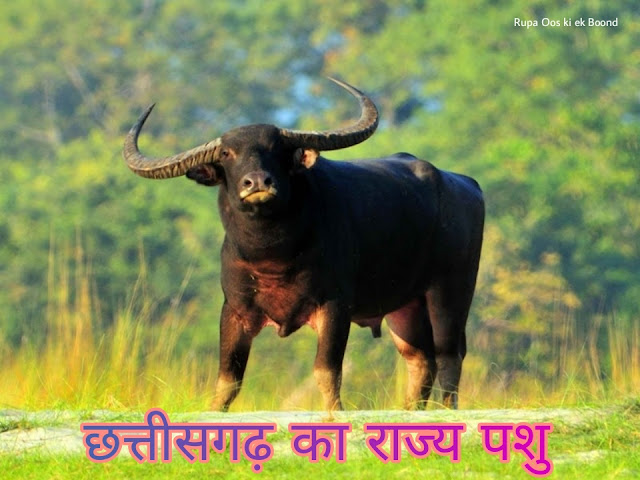
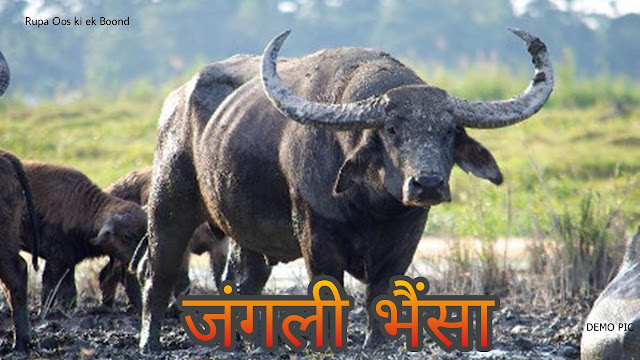
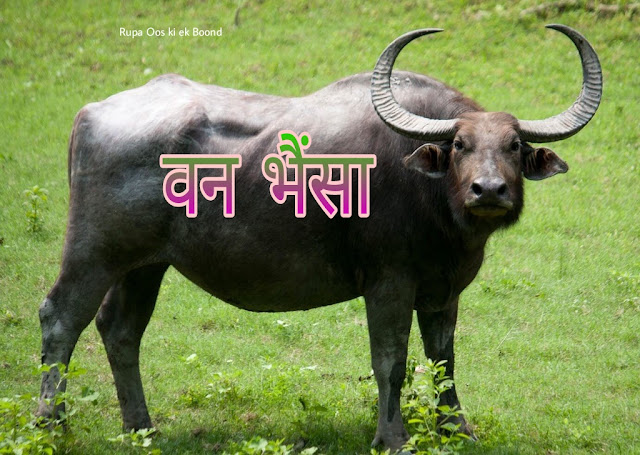
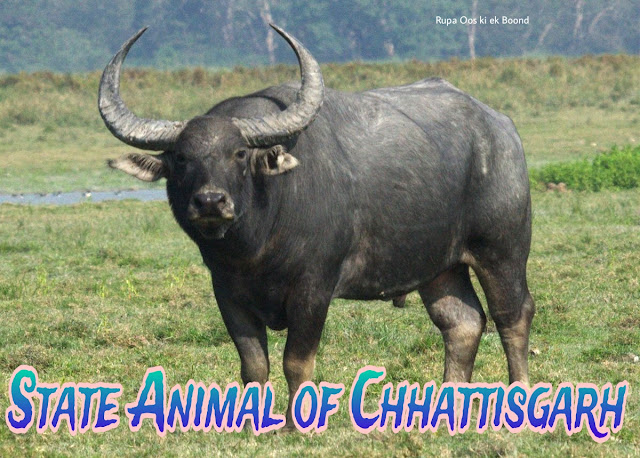
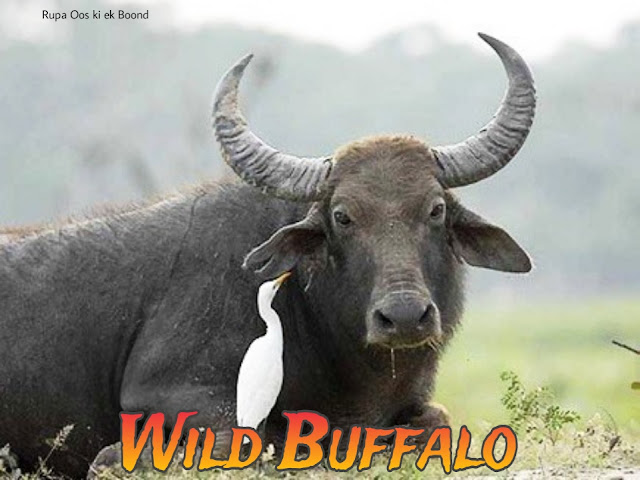
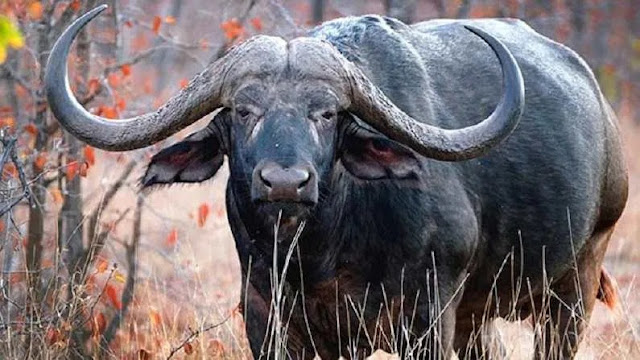

बहुत अच्छी जानकारी 👌👌
ReplyDeleteअच्छी जानकारी
ReplyDeleteVery informative
ReplyDeleteSuper knowledge 👌🏼
ReplyDelete🙏🙏💐💐
ReplyDelete🕉️शुभरात्रि 🕉️
🙏जय जय श्री कृष्णा 🚩🚩🚩
👍👍👍बहुत अच्छी जानकारी शेयर करने के लिए आप का बहुत बहुत धन्यवाद 💐💐
Nice information
ReplyDeleteThis is sad news.
ReplyDeleteGood information
ReplyDelete